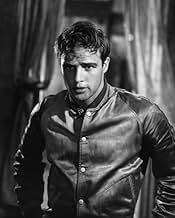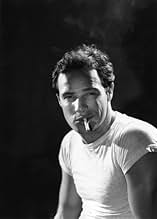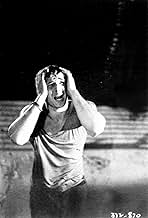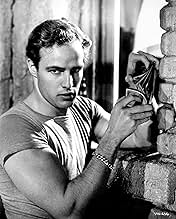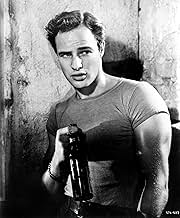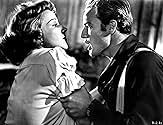La afligida Blanche DuBois se muda con su hermana a Nueva Orleans y se ve atormentada por su brutal cuñado mientras la realidad se desmorona a su alrededor.La afligida Blanche DuBois se muda con su hermana a Nueva Orleans y se ve atormentada por su brutal cuñado mientras la realidad se desmorona a su alrededor.La afligida Blanche DuBois se muda con su hermana a Nueva Orleans y se ve atormentada por su brutal cuñado mientras la realidad se desmorona a su alrededor.
- Ganó 4 premios Óscar
- 22 premios ganados y 15 nominaciones en total
James Adamson
- Extra
- (sin créditos)
Irene Allen
- Extra
- (sin créditos)
Mel Archer
- Foreman
- (sin créditos)
Walter Bacon
- Club Patron
- (sin créditos)
Dahn Ben Amotz
- Minor Role
- (sin créditos)
Opiniones destacadas
Tennessee Williams himself wrote of Vivien Leigh"s performance in "Streetcar Named Desire": "She brought everything I intended to the role and even much more than I had dared dream of".
Brando is wonderful as Stanley Kowalski, but the new viewers to the film seem to come away with the haunting greatness of Vivien Leigh in what is one of the most harrowing and shattering pieces of acting ever committed to film.
Although some have expressed regret that Jessica Tandy did not repeat her stage performance, it is probably good to note that her husband Hume Cronyn and Elia Kazan (the director of the film and play) both never felt that Tandy quite got the character right. If you listen to the radio performance of extracted scenes that Tandy gave on the occasion of the Pulitzer Prize award, it will reenforce the perfection of Leigh's inflections and innate understanding of the role. This inner and complete understanding is what Brando praises Leigh for in his autobiography. He agrees that she plays this Hamlet of female roles better than anyone because he felt she was quite like the character...sadly.
If anyone is interested in great acting check out "Streetcar" for Vivien Leigh's Academy Award winning performance. The supporting cast is outstanding from Kim Hunter and Karl Malden (both Oscar winners for the film)to, of course, the iconographic T-shirt-torn Brando.
Brando is wonderful as Stanley Kowalski, but the new viewers to the film seem to come away with the haunting greatness of Vivien Leigh in what is one of the most harrowing and shattering pieces of acting ever committed to film.
Although some have expressed regret that Jessica Tandy did not repeat her stage performance, it is probably good to note that her husband Hume Cronyn and Elia Kazan (the director of the film and play) both never felt that Tandy quite got the character right. If you listen to the radio performance of extracted scenes that Tandy gave on the occasion of the Pulitzer Prize award, it will reenforce the perfection of Leigh's inflections and innate understanding of the role. This inner and complete understanding is what Brando praises Leigh for in his autobiography. He agrees that she plays this Hamlet of female roles better than anyone because he felt she was quite like the character...sadly.
If anyone is interested in great acting check out "Streetcar" for Vivien Leigh's Academy Award winning performance. The supporting cast is outstanding from Kim Hunter and Karl Malden (both Oscar winners for the film)to, of course, the iconographic T-shirt-torn Brando.
With a screenplay by Tennessee Williams, direction from Elia Kazan and quite possibly the greatest performance ever in Vivien Leigh's Blanche DuBois- you can't go wrong.
This movie is dark, gritty and, at times, disturbing in its portrayals of domestic abuse and mental illness. It's astonishing how much of a punch this movie still has after all these years. This just goes to show what a true genius Tennessee Williams really was. The characters he wrote, with all their own complexities and contradictions, and the script with its haunting poetry and now iconic lines are all classic.
But what good is a great script without great actors? Well, luckily, the cast couldn't have been better. Here we have a young Marlon Brando as the brutish Stanley Kowalski, who is truly ferocious in the role. We then have Kim Hunter who gives a great performance as the weak-willed Stella. Stella is the most likeable character in the movie for all she wants is for everyone to get along. Karl Malden is equally great as Mitch, who is seemingly weak and simple and serves as a contrast to Stanley's brutality. Then we have Vivien Leigh as Blanche DuBois. As I said above, I believe Leigh's performance here to be the greatest ever to be committed to film and here's why- Blanche DuBois is probably one of the most complicated characters ever written. She's a compulsive liar, who lives in a world of her own, choosing to create her own reality rather than acknowledge her bleak surroundings. She's a snob, a hypocrite and a user but at the same time she's an underdog who's had a tough life and just wants to be loved. Tennessee Williams himself said of Vivien's performance that 'she brought everything I intended to the role and even much more than I had dared dream of' which pretty much sums up her performance here. She truly gives herself to the darkness of Blanche DuBois, she's unpredictable, tormented and haunting while still somehow sympathetic. Through Leigh's mastery of her character we see that Blanche is really just a daffodil in a windstorm rather than a bad person. Every time I watch this film I notice a new nuance in her performance, whether it's a look in her eye that I hadn't noticed before or a change in her voice as Blanche lets her mask slip- never has there been such a true embodiment of a character.
So all this considered, with Kazan's brilliant direction, great cinematography and the unique "jazzy" score, is why I consider 'A Streetcar Named Desire' one of the greatest films ever made. It's not a film for everyone- it's heavy from the start, it's quite talky and most of the film takes place within the Kowalski's apartment but if you want a movie with brilliant acting and a dark, poetic script then there's no better film than this.
This movie is dark, gritty and, at times, disturbing in its portrayals of domestic abuse and mental illness. It's astonishing how much of a punch this movie still has after all these years. This just goes to show what a true genius Tennessee Williams really was. The characters he wrote, with all their own complexities and contradictions, and the script with its haunting poetry and now iconic lines are all classic.
But what good is a great script without great actors? Well, luckily, the cast couldn't have been better. Here we have a young Marlon Brando as the brutish Stanley Kowalski, who is truly ferocious in the role. We then have Kim Hunter who gives a great performance as the weak-willed Stella. Stella is the most likeable character in the movie for all she wants is for everyone to get along. Karl Malden is equally great as Mitch, who is seemingly weak and simple and serves as a contrast to Stanley's brutality. Then we have Vivien Leigh as Blanche DuBois. As I said above, I believe Leigh's performance here to be the greatest ever to be committed to film and here's why- Blanche DuBois is probably one of the most complicated characters ever written. She's a compulsive liar, who lives in a world of her own, choosing to create her own reality rather than acknowledge her bleak surroundings. She's a snob, a hypocrite and a user but at the same time she's an underdog who's had a tough life and just wants to be loved. Tennessee Williams himself said of Vivien's performance that 'she brought everything I intended to the role and even much more than I had dared dream of' which pretty much sums up her performance here. She truly gives herself to the darkness of Blanche DuBois, she's unpredictable, tormented and haunting while still somehow sympathetic. Through Leigh's mastery of her character we see that Blanche is really just a daffodil in a windstorm rather than a bad person. Every time I watch this film I notice a new nuance in her performance, whether it's a look in her eye that I hadn't noticed before or a change in her voice as Blanche lets her mask slip- never has there been such a true embodiment of a character.
So all this considered, with Kazan's brilliant direction, great cinematography and the unique "jazzy" score, is why I consider 'A Streetcar Named Desire' one of the greatest films ever made. It's not a film for everyone- it's heavy from the start, it's quite talky and most of the film takes place within the Kowalski's apartment but if you want a movie with brilliant acting and a dark, poetic script then there's no better film than this.
10JFHunt
I often asked myself this question with mixed responses. Did Brando make Streetcar great? Or was he just great in it?
Vivien Leigh is simply haunting and never not shocking. There is more going on there than just a performance. She appears out of herself and hovering ever so softly above. As for the rumored mental illnesses, I can only speculate. I do know for sure that her visualization of Blanche DuBois is the single best performance by an actress I've seen. Well that might not mean much, but I've seen a lot of movies.
Brando made On the Waterfront a classic, but Leigh made Streetcar unforgettable. I always felt like it was a continuation from her most timeless role as Scarlett O'Hara in Gone with the Wind. Like what would have happened to Scarlett, if she was allowed to grow old. Maybe I'm just crazy. But I think the billing says it all; Vivien Leigh, Marlon Brando, Kim Hunter, Karl Malden. I don't think you could dream up a finer cast. Brando might have been the sexiest thing alive, but it's obvious that Leigh made this film great with some memorable help from some movie icons.
Brando may have sent an Indian to receive his second Oscar, but Leigh used her second as a doorstop to her bathroom.
Vivien Leigh is simply haunting and never not shocking. There is more going on there than just a performance. She appears out of herself and hovering ever so softly above. As for the rumored mental illnesses, I can only speculate. I do know for sure that her visualization of Blanche DuBois is the single best performance by an actress I've seen. Well that might not mean much, but I've seen a lot of movies.
Brando made On the Waterfront a classic, but Leigh made Streetcar unforgettable. I always felt like it was a continuation from her most timeless role as Scarlett O'Hara in Gone with the Wind. Like what would have happened to Scarlett, if she was allowed to grow old. Maybe I'm just crazy. But I think the billing says it all; Vivien Leigh, Marlon Brando, Kim Hunter, Karl Malden. I don't think you could dream up a finer cast. Brando might have been the sexiest thing alive, but it's obvious that Leigh made this film great with some memorable help from some movie icons.
Brando may have sent an Indian to receive his second Oscar, but Leigh used her second as a doorstop to her bathroom.
"Streetcar Named Desire" is an exceptional film, thanks to three essential components: (1) the superb acting ability of its two leads, Vivien Leigh and Marlon Brando, as well as that of the supporting cast, small in number but huge in its combined dramatic power, (2) an excellent screenplay by the original playwright, Tennessee Williams, that is packed from beginning to end with explosive, conflict driven dialogue, and (3) the brilliant direction of Elia Kazan who so skillfully brings the play to the screen.
In its legendary opening, Blanche DuBois (Vivien Leigh) emerges from a cloud of locomotive smoke and is helped onto a streetcar by a perfect stranger, a sailor. This simple act neatly ties the film's beginning to Blanche's final, heartbreaking line, "I have always depended upon the kindness of strangers". She, as the central character, is lost in the big city, and she becomes more and more hopelessly adrift in the world as the film approaches its very tragic end.
Broke and friendless, Blanche lands in New Orleans where her sister, Stella (Kim Hunter) lives with her coarse, crude husband, Stanley Kowalski (Brando). Having lost her ancestral home on account of family-related debt and having been dismissed under vague circumstances from her position as a high school English teacher in the small Mississippi town from where she came, she has no other place to go at a time of dire need.
Although Stella is genuinely concerned about Blanche's declining physical and mental state, the shabby apartment where she lives with Stanley consists of two small rooms, barely enough space for the Kowalskis even without Stanley's regular poker group, which seems to park itself there at every available opportunity. What makes matters worse is Stanley's loud and boisterous personality. From the start, Stanley resents the presence of Blanche, which he views as an unwanted, disruptive invasion of his marriage and his home. He regards her with total distrust and disdain. Another reviewer here interpreted this as a cultural clash between the old and the new South, and I think that is a very astute observation. In any case, Stanley is totally unsympathetic to Blanche's plight and looks upon her with nothing but suspicion and contempt.
Blanche is trapped in the claustrophobic and confining prison of the dingy Kowalski apartment. For one, fleeting moment, she believes that Mitch (Karl Malden), Stanley's poker buddy and co-worker, stands as her one bright hope of liberation from the walls that continue to close around her, but he turns out to be anything but her desperately needed "knight in shining armor". Tragically, Mitch, a weak individual who is still dominated by a strong mother well into his adulthood, is the last person with the ability to give Blanche the love and strength that she so urgently needs and to whisk her away from the stifling, debilitating atmosphere of the Kowalski dungeon. Blanche's one, last hope for personal redemption soon fades away forever.
I read that, under different circumstances, the lead roles could have been awarded to Olivia de Haviland and John Garfield. As much as I like them both, this would have been a much different movie with them as the leads. Ms. Leigh, a stunning Englishwoman who managed to score two Oscars for playing two iconic, southern American characters, portrays a mentally declining Blanche with great depth and compassion. As to Mr. Brando's brutish and obnoxious Stanley, you've got to see him in action to appreciate his magnificent performance. As in the case of his Terry Malloy in "On the Waterfront", I don't believe that Stanley's most famous lines from this film would be among the most imitated to this day if they weren't delivered so dynamically by Brando in the first place. "Hey, Stel-la!" Sorry. I just couldn't help myself.
While Brando was beaten out of the Oscar by Humphrey Bogart in "African Queen" (not my favorite Bogey movie by a long shot), Leigh, Malden, and Hunter swept the awards for their performances here and deservedly so. The memorable role of feisty neighbor Eunice also launched Pat Hillias's successful career throughout the golden age of television during the 1950's until her tragic and untimely death in 1960.
If you want to watch an unforgettable rendering of a strong, intense script that is worthy of such a talented cast and director, don't miss this one.
In its legendary opening, Blanche DuBois (Vivien Leigh) emerges from a cloud of locomotive smoke and is helped onto a streetcar by a perfect stranger, a sailor. This simple act neatly ties the film's beginning to Blanche's final, heartbreaking line, "I have always depended upon the kindness of strangers". She, as the central character, is lost in the big city, and she becomes more and more hopelessly adrift in the world as the film approaches its very tragic end.
Broke and friendless, Blanche lands in New Orleans where her sister, Stella (Kim Hunter) lives with her coarse, crude husband, Stanley Kowalski (Brando). Having lost her ancestral home on account of family-related debt and having been dismissed under vague circumstances from her position as a high school English teacher in the small Mississippi town from where she came, she has no other place to go at a time of dire need.
Although Stella is genuinely concerned about Blanche's declining physical and mental state, the shabby apartment where she lives with Stanley consists of two small rooms, barely enough space for the Kowalskis even without Stanley's regular poker group, which seems to park itself there at every available opportunity. What makes matters worse is Stanley's loud and boisterous personality. From the start, Stanley resents the presence of Blanche, which he views as an unwanted, disruptive invasion of his marriage and his home. He regards her with total distrust and disdain. Another reviewer here interpreted this as a cultural clash between the old and the new South, and I think that is a very astute observation. In any case, Stanley is totally unsympathetic to Blanche's plight and looks upon her with nothing but suspicion and contempt.
Blanche is trapped in the claustrophobic and confining prison of the dingy Kowalski apartment. For one, fleeting moment, she believes that Mitch (Karl Malden), Stanley's poker buddy and co-worker, stands as her one bright hope of liberation from the walls that continue to close around her, but he turns out to be anything but her desperately needed "knight in shining armor". Tragically, Mitch, a weak individual who is still dominated by a strong mother well into his adulthood, is the last person with the ability to give Blanche the love and strength that she so urgently needs and to whisk her away from the stifling, debilitating atmosphere of the Kowalski dungeon. Blanche's one, last hope for personal redemption soon fades away forever.
I read that, under different circumstances, the lead roles could have been awarded to Olivia de Haviland and John Garfield. As much as I like them both, this would have been a much different movie with them as the leads. Ms. Leigh, a stunning Englishwoman who managed to score two Oscars for playing two iconic, southern American characters, portrays a mentally declining Blanche with great depth and compassion. As to Mr. Brando's brutish and obnoxious Stanley, you've got to see him in action to appreciate his magnificent performance. As in the case of his Terry Malloy in "On the Waterfront", I don't believe that Stanley's most famous lines from this film would be among the most imitated to this day if they weren't delivered so dynamically by Brando in the first place. "Hey, Stel-la!" Sorry. I just couldn't help myself.
While Brando was beaten out of the Oscar by Humphrey Bogart in "African Queen" (not my favorite Bogey movie by a long shot), Leigh, Malden, and Hunter swept the awards for their performances here and deservedly so. The memorable role of feisty neighbor Eunice also launched Pat Hillias's successful career throughout the golden age of television during the 1950's until her tragic and untimely death in 1960.
If you want to watch an unforgettable rendering of a strong, intense script that is worthy of such a talented cast and director, don't miss this one.
10Rathko
There is little to be said about this movie that thousands of critics have not stated already. It is a magnificent piece of cinema, with an intricate script delivered by actors at the peak of their talents. Leigh is unbearably brittle and fragile and she dances precariously on the edge of sanity. Marlon Brando embodies a sense of brooding masculinity that other men can only dream of attaining, while creating an enduring cinema icon and delivering one of the all-time great movie lines. From the raucous jazz score to the sleazy production design bathed in smoldering grey, 'Streetcar' is a class-act from beginning to end; sexy, brutal, and endlessly fascinating.
¿Sabías que…?
- TriviaAs the film progresses, the set of the Kowalski apartment actually gets smaller to heighten the suggestion of Blanche's increasing claustrophobia.
- ErroresWhen Stanley comes back from taking Stella to the hospital, he is looking for a bottle opener. He finds it on the mantelpiece, shakes up a bottle of beer, and opens it. The beer foams up and spills on his trousers. But if you watch at the moment when he swings himself up to sit on the table - before he opens the bottle - you can see that the front of his trousers are already wet. Apparently they re-shot it without him changing into dry trousers.
- Versiones alternativasThe scene in which Blanche and Stanley first meet was edited a bit to take out some of the sexual tension that both had towards each other when the film was first released in 1951. In 1993, this footage was restored in the "Original Director's Version" of the film. The three minutes of newly-added footage sticks out from the rest of the film because Warner Brothers did not bother to restore these extra film elements along with the rest of the movie, leaving them very scratchy due to deterioration.
- ConexionesEdited into Un Américain nommé Kazan (2018)
- Bandas sonorasIt's Only a Paper Moon
(1933) (uncredited)
Music by Harold Arlen
Lyrics by E.Y. Harburg and Billy Rose
Sung by Vivien Leigh while doing her hair
Selecciones populares
Inicia sesión para calificar y agrega a la lista de videos para obtener recomendaciones personalizadas
Detalles
- Fecha de lanzamiento
- País de origen
- Idiomas
- También se conoce como
- A Streetcar Named Desire
- Locaciones de filmación
- Nueva Orleans, Luisiana, Estados Unidos(railway station)
- Productoras
- Ver más créditos de la compañía en IMDbPro
Taquilla
- Presupuesto
- USD 1,800,000 (estimado)
- Total a nivel mundial
- USD 54,695
- Tiempo de ejecución2 horas 2 minutos
- Color
- Relación de aspecto
- 1.37 : 1
Contribuir a esta página
Sugiere una edición o agrega el contenido que falta

Principales brechas de datos
What was the official certification given to Un tranvía llamado Deseo (1951) in Japan?
Responda






